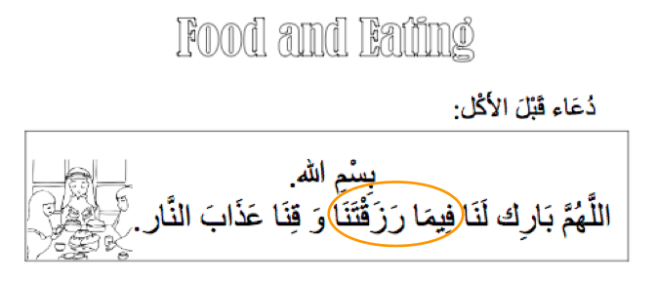Yesterday, we went through the word-by-word translation of اللَّهُمَّ بَارِكْ لَنَا.
(in case you’re joining us just now and want to know what we’re trying to do here and why, you can start with what my first trip to India taught me about learning languages — or start with our very first word-by-word translation lesson here.)
Today, we’ll be going through the part of the prayer that says فِيمَا رَزَقْتَنَا.
فِيمَا
fee maa – in what
فِيمَا (feemaa) is actually two words joined together.
The first word is فِي (fee), which means “in”. As with any preposition, you can imagine this is a very common word. If you want to say “in the mosque”, you would say فِي الْمَسْجِدِ. “In the house” is فِي الْبَيْتِ. “In the month of Ramadan” is فِي شهْرِ رَمَضَان.
The second word is مَا (maa), which means “what”. It’s also a very common word. When we say مَا شَاءَ الله (maa shaa Allah), that means “what God wants”.
رَزَقْتَنَا
razaqtanaa – you provided us
رَزَقْتَنَا (razaqtanaa) is two words put together (or three — if you consider the pronoun “you” to be a separate word):
رَزَقْتَ (razaqta) means “you provided”.
The root letters ر (raa) – ز (zaa) – ق (qaaf) give the meaning of provision or sustenance. For example رِزْق (rizq) means “provision” or “sustenance”.
The suffix تَ means that “you (masculine singular)” are doing the verb. If we change it from رَزَقْتَ (razaqta) to رَزَقْنَا (razaqnaa), you change the meaning from “you provided” to “we provided”.
The final suffix, نَا (naa) means “us”. We saw this at the end of اللَّهُمَّ بَارِكْ لَنَا. The نَا (naa) there in لَنَا (lanaa) means “for us”. Here we see the same نَا (naa) in رَزَقْتَنَا (razaqtanaa), which means “you provided us”. So again, نَا (naa) means “us”.
Next, we’ll be going through the final part of this du’a: وَ قِنَا عَذَابَ النَْار.

2 thoughts on “Word by word translation: فِيمَا رَزَقْتَنَا”